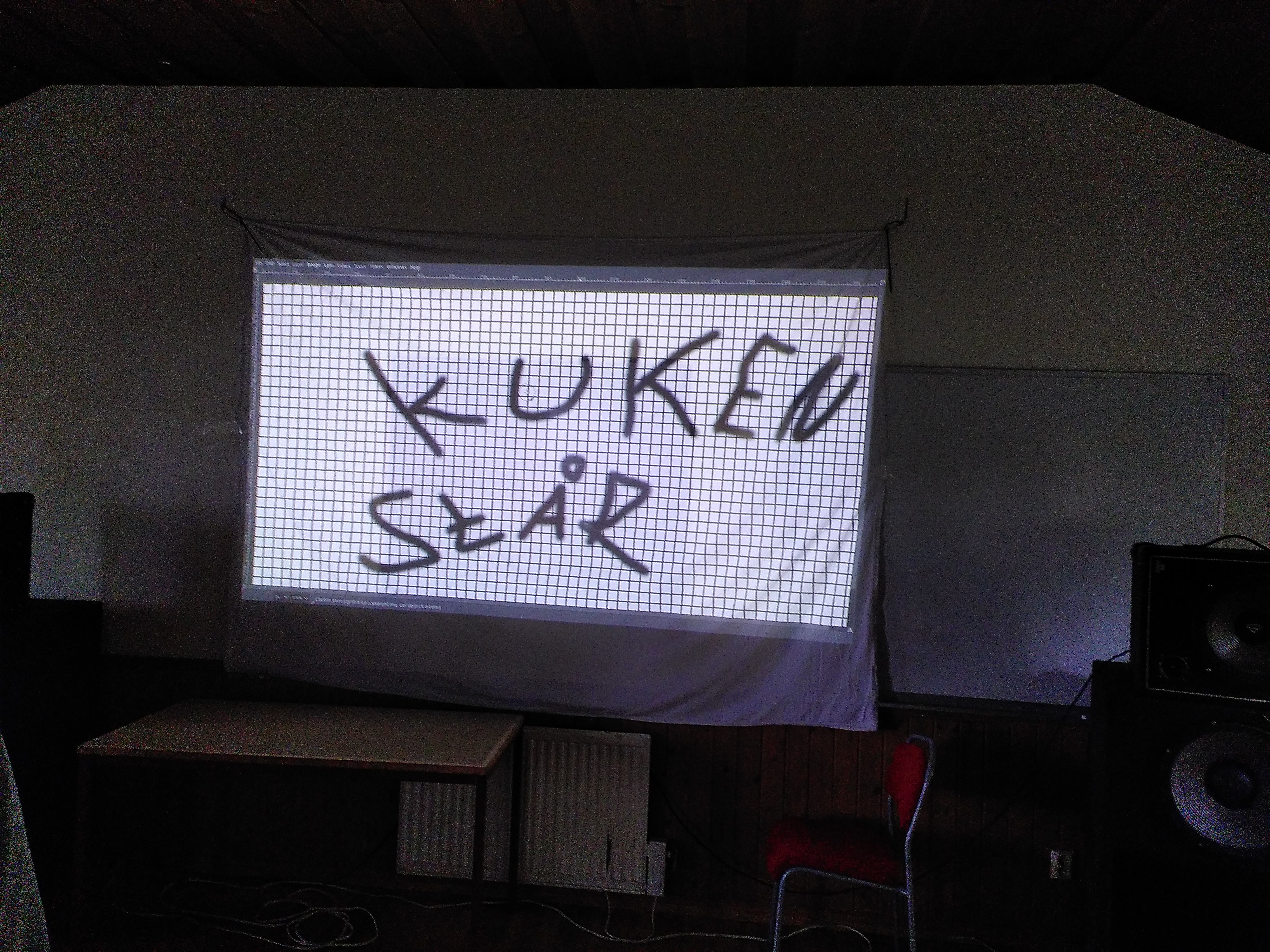Give me your wordplay and obscure culture references, I love them all.
In Japanese: 春夏冬
It means spring (haru), summer (natsu), winter (fuyu). What’s missing? Autumn. In other words, autumn (aki) is nonexistent (nai), so this is pronounced akinai, which means “not getting tired/bored of something”.Who’s the stinkiest Norse god? Gar-loki
Works better in Dutch, I swear
3 students share an apartment and 2 of them study a lot but the third spends most his nights partying. The 2 studious housemates decide to pull a prank on him, and one night when he comes home they are waiting for him next to the bedroom door wearing white sheets. One of the friends says ‘welcome friend, I am Peter!’. The other says ‘welcome friend, I am Paul’. The drunk house mate looks at them and says ‘Colleagues! would you mind stepping aside? I am Lazarus!’
yeah, that doesn’t translate… in Dutch, the names refer to St peter and St Paul and both end in -us as well: Petrus and Paulus. Also, ‘being Lazarus’ means being very drunk.
Får får inte får. Får får lamm.
sheeps don’t get sheeps. Sheeps get lambs.
Får = sheep/to get
var tog vägen vägen? Ute på en åker och åker
where did the road go? Out in a field and driving
“Tog vägen” = literally “took the road”, meaning “where did it go”, sort of. And åker = driving and a farm field.
I got a t-shirt from the Swedish Society for People with Anxiety. It came with a print on the chest.
“print on the chest” would be “tryck för/på/över bröstet” having the double meaning “preassure over the chest”.
Then there are endless of jokes from Gothenburg which all do not translate.
Who is faster, Eminem or Taylor Swift? Eminem, he is a rapper
“rapper” in swedish is “rappare”, meaning also “faster”.
In stockholm a snake escaped the zoo and has not been found. The zoo is missing him a lot
The last bit in swedish would be “saknaden är enorm”, “saknad” being the emotion of missing someone, “enorm” being large/a lot/great. But also enorm=en-orm=a-snake.
¿Que hace el pez?
Nada.
Spanish wordplay: ¿Por qué está feliz la escoba? Porque siempre barriendo.
Translation: Why is the broom happy? Because it’s always sweeping (barriendo = sweeping, sounds like va riendo = goes around laughing)
Oye, esa oración no tiene sen—ooooooh. 🙈
El pan está blando ¿Y qué dice?
Two divers meet. One say “Hi” the other says “where?!”
Two hunters meet. Both of them are dead.
Which language of origin?
Hai (similar pronunciation as hi) = shark
German.
German:
-
Joke: “Hi” is spoke like “Hai” German for shark. So when two divers meet and one says hi, the other thinks, where is the shark??
-
Joke: “to meet” is translated in german as treffen. Treffen can also the mean to hit. So the joke goes from a freindly meet up between hunters to both of them hitting eachother while on the hunt and dying.
isnt it haifisch? rammstein vocabulary sorry
Haifisch is also correct but less commonly used. Sounds a bit old-timey, my first association is Mackie Messer (Mac the Knife): “Und der Haifisch, der hat Zähne”.
that song is actually pretty killer, pun intended…
the rammstein lyrics are also pretty dope:
Und der Haifisch, der hat Tränen Und die laufen vom Gesicht, doch der Haifisch lebt im Wasser – so die Tränen sieht man nicht.
cool little song also
It works in Norwegian as well, both of them.
But for the shark one in Norwegian there’s this one:
What did the sand say to the shark? Hihi
What did the shark say to the sand? Hi sand
We also say hai in Finnish for shark
That is so incredibly german, holy shit.
-
Both of these work in Swedish as well
hai, lika i svenska?
“Was ist der Unterschied zwischen Schach und Billard?” - “Beim Schach hat man den Kö nich.”
“What’s the difference between chess and billiards?” - Answer is a pun, can mean both “You have the king.” and “You don’t have the cue.” Doesn’t translate at all.
A joke in Spanish: ¿Como se dice “autobus” en alemán? “subanstrujenbajen”
Explanation: The question asks how to say “bus” in German. The answer is a form of the words “get on, squeeze, get off” made to look/sound like faux German.
I didn’t know alemán was another way to say “German.” I play early music, and it’s also a type of song known as a “German dance,” so that makes a lot of sense.
The French call Germany “Allemande” as well.
Dutch: Er liep een man in de woestijn en die vond een kameel, maar de kameel vond van niet.
English: A man was walking in the desert and he found a camel, but the camel found he hadn’t.
I don’t know, maybe it works in English too.
I don’t get it, and I speak Dutch…
Sorry, can’t help you there. There’s nothing less funny than explaining jokes, except maybe this joke…
Well, OP didn’t specify good jokes…
Abraham to Beebraham: “Okay to borrow your zebra for a sec?”
Tap for spoiler
“Can I borrow your zebra” in rather casual speech is “Kann ich ma dein Zebra ham”, where “Zebra ham” sounds like C-braham. As in A-braham B-braham C-braham. I swear it’s hilarious.
Finland and sweden were having a competition about which language is the most beautiful. Finland was let to choose the sentence and “saari, saari, heinäsaari, heinäsaaren neito”. In swedish its “Ö, ö, hö ö, hö ö mö”
(in english its “island, island, grassy island, grassy island’s maiden”)
An Ulster Scots one:
“Ballymena mawn went uptae glens in Canadae yin dae”
“An he saa tae yer man in the pub: What’s that thaer on tha wall?”
"An the publickan saa “Why, That’s a moose”
"Ballymena man saa: “Aye? That a moose? Sure, if thats a moose then yer cats must be wile big!” "
As a Canadian in Scotland, this is the number one joke I’m told by Scots. Closely followed by the statement “I’ve a (cousin/sister/brother/uncle/auntie etc) in Canada.” I swear, it’s probably 1 in 3 Scots with family in Canada.
Hibbedi bobbedi hopfn, jetzt hoats a mal dei Fotzn.
I hope this isn’t racist as I never thought it was. Best told to an English speaker who only speaks that one language.
A Chinese man is walking down the street and he notices a Chinese friend of his on the other side of the street, walking the opposite way. He yells across the street to his friend “(do fake Chinese talk)”. His friend yells back “(more fake Chinese talk)”. He answers him back with more fake Chinese talk while starting to laugh. He then laughs like a loon as if it is the best joke he’s ever heard.
There is no joke to get but only pretending there was one. Stupid and absurd, I know.
After the workers are finished, Mandy from Saxony comes home to see the result of the house renovation.
The entire floor is covered in white bread.
She shouts “What’s this? I wanted a hardwood floor, not a baguette floor!”(Ich wollte Parkettboden, keinen Baguetteboden)
(Parkett and Baguette are pronounced exactly the same in Saxonian dialect)












